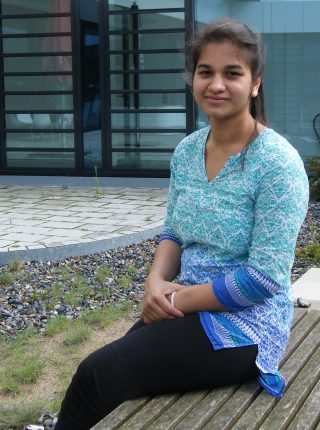Young people in India are more interested in engineering, Dr. Rashmi Singla thinks. Very early in her life the Louise Johnson Fellow from the North of the subcontinent, however, knew that she wanted to do physics.
As a school girl Singla already tried experiments at home and later did her Bachelor in a course combined of physics, chemistry and mathematics. After receiving her diploma, she started teaching classes for 11 and 12 grade people and thus earned some money. “It was a great feeling, because it gave me little independence,” the scientist says. Education was very important for her parents and they were open for whatever interested their daughter – as long as she became independent, which is their credo.

Dr. Rashmi Singla tries to develop a very challenging technique for table-top experiments. Credit: Adler
Singla did her Master’s in physics at the Indian Institute of Technology, Roorkee and spent two months as an intern at the University of Fribourg in Switzerland. “I was introduced to Europe for the first time and it completely opened me; my vision about science, about society, and about an independent life became broadened intensively. After that I decided to do my PhD in Europe,” the physicist says. She sent her first application to Prof. Andrea Cavalleri from today’s Max Planck Institute for the Structure and Dynamics of Matter, who invited her to come to Hamburg. It was him as well, who advised her to go to the US after she had completed her PhD five years later to broaden her view of science even more.
Prestigious and competitive fellowship
In the meantime, however, Singla had married an Indian scientist living in Hamburg. So after spending a year as a postdoc at the University of California, San Diego, she applied for CUI’s Louise Johnson Fellowship in Hamburg. “It came as a surprise to me that I got it, because I knew how prestigious and how competitive the fellowship is. Achieving it gave me a lot of confidence,” the scientist emphasizes. Campus Bahrenfeld is an ideal base for her to do her postdoc since a lot of scientists from all different research fields are working here to exchange ideas. “So I knew, that in this place I can grow scientifically and meet people to talk to and trouble-shoot problems,” she describes her expectations for the time spent within CUI. The time-resolved core-level photoemission spectroscopy using extreme ultraviolet (XUV) laser generated in Prof. Adrian Cavalieri’s (MPSD) lab, where she is doing research now, is complementary to the technique Singla used in her PhD.
Very challenging project
For the last six months Singla has been working on a very challenging project: developing a source for table-top experiments where fast electronic and lattice dynamics can be captured with less than 5 fs time-resolution and simultaneously with high energy-resolution of less than 1eV, which is required to resolve the core-level atomic features in correlated systems. Singla: “We are making progress, but it is a very difficult project which requires a lot of work for me and my supervisor in the lab. That’s very challenging at times, but Professor Adrian Cavalieri knows things very well and gives me a good chance to learn especially on the technique.”
Singla’s future plans are fixed: “I hope that I can do science and contribute to physics all my life.” She got very inspired by Louise Johnson’s accomplishments and the fellowship named after the famous late crystallographer has provided her with confidence that she can pursue her goals – one day maybe in India to help promoting women’s contributions in science. She visits her home country once a year, but being in Germany she doesn’t miss India – neither Germany in India. Singla: “I get easily into where I am. I just be.”

